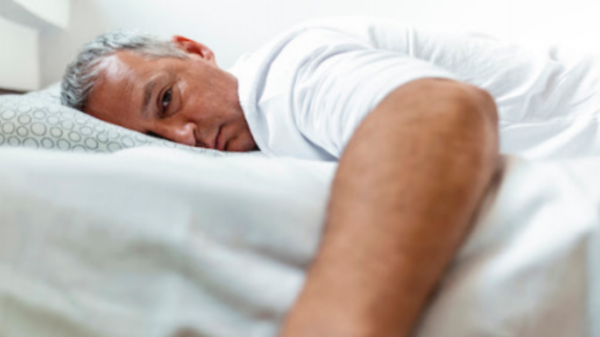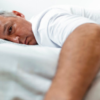
Zaiba Jetpuri, D.O., Safia Khan, M.D.
Family and Community Medicine
The health effects of sleep disturbances are well-documented, from recent news reports stating that getting 7-8 hours of good sleep nightly may decrease cardiovascular risk by 75% to tragic reports of fatigued drivers falling asleep at the wheel. In June 2022, the American Heart Association added getting better sleep to its list of top heart-healthy behavioral factors.
The implications of chronic obesity are also well-documented, as the condition has been associated in many studies with an increased risk of disorders such as Type 2 diabetes, high blood pressure, nonalcoholic fatty liver disease, and depression.
What might surprise people is just how closely the health epidemics of obesity and chronic sleep problems are linked.
Obesity can cause sleep disturbances, which in turn influence weight gain through reduced energy levels and biological hardwiring that floods the body with stress hormones. But perhaps the most frustrating part of this vicious cycle is that poor sleep can be lifesaving in certain circumstances for people with obesity. When breathing is disrupted or when our legs unexpectedly twitch, the body releases stress hormones and quickens the heartbeat to wake us up. While this defense mechanism keeps patients breathing, it prevents deeper, restorative sleep and floods the body with chemicals that drive us to retain energy stores instead of burning them.
In the U.S., more than 40% of people have obesity and about 21% of people have a sleep disorder. Nationally, over 70% of patients with obstructive sleep apnea, a common and potentially fatal sleep and breathing disorder, also have obesity.
So, because sleep disorders and obesity are so common, where do we start in helping patients improve their health?
While there is no single chicken-or-egg scenario, we observe in our Family Medicine and Sleep and Breathing Disorders clinics that by the time a patient starts having sleep problems, they have already started to become overweight or developed obesity. Troubled sleeping is often what brings them to the doctor – on their own or at the request of a bed partner who is fed up with loud snoring.
Also often, correcting sleep issues is the quickest win for patients, and that is where we start. But the key to long-term health is to help the patient understand what caused their sleep disturbance and weight management concerns in the first place – and to equip them with information to reduce hormonal, chemical, and cardiovascular risks associated with these dual epidemics.
How sleep-triggered hormones lead to weight gain
When someone has trouble sleeping, their body enters a “fight or flight” state. The brain releases a rush of hormones that cause the person to wake up before hitting deep sleep. The chemicals also instruct the body to conserve energy from food that might be needed later in the emergency, leading to potential weight gain. The hormones at work include:
- Ghrelin: This hormone signals hunger and stimulates the appetite. Ghrelin also activates the growth hormone secretagogue receptor (GHS-R).
- GHS-R: This receptor stimulates food intake and the growth hormone secretion, which in adults with obesity promotes storage of fat that could be burned for energy.
- Leptin: Created in your fat cells, this hormone signals satiety (feeling full). When the body is chronically hit with too much leptin, you can become resistant to it, which can lead to overconsumption of calories.
- Insulin: Made in the pancreas, this hormone manages how the body absorbs and uses sugar (glucose) for energy. With too much circulating insulin, resistance occurs that can lead to weight gain.
- Cortisol: This is the ultimate “fight or flight” stress hormone. Cortisol floods the bloodstream with sugar and heightens the brain’s absorption of sugar. It also shuts down functions that could harm you in an emergency – such as staying asleep.
When you wake up suddenly and find no emergency, it can be tough to get back to sleep. Even if you do, all the extra energy and chemicals remain. Chronic sleep disruption can interfere with normal hormone production, which increases the risk of developing obesity.

Low oxygen saturation stresses body systems
Obesity changes the way the entire body functions. Excess weight isn’t just accumulated on the outside; it promotes fat storage internally throughout the body, including the airways of the throat and in the abdomen.
These fat deposits make less room for the lungs to expand while breathing and create resistance by weighing down the lungs and diaphragm, which is the muscle that keeps you breathing during rapid eye movement (REM), the deepest stage of sleep.
People have vivid dreams during REM sleep, and most of our muscles are temporarily paralyzed during this stage to prevent acting them out – including the abdominal muscles that support breathing during the day. Oxygen saturation can drop significantly during REM sleep.
A healthy blood oxygen saturation level – the amount of oxygen in the blood – is 90% or higher. Dropping lower than that for a significant amount of time is called hypoxia, and it triggers the stress response of flooding hormones that increase your heart rate and wake you up. Severe hypoxia is less than 88% blood oxygen saturation or lower for more than 5 minutes during the night. In extreme cases, such as with uncontrolled obstructive sleep apnea, we have seen it dip into the 70s or lower.
Along with waking up frequently and snoring – which is a symptom of sleep apnea – patients with obesity may experience mild to severe signs of hypoxia at night, such as:
- Confusion or seeing things that aren’t there
- Lightheadedness
- High blood pressure
- Headache
- Bluish tint to the skin, lips, or nails
- Rapid heart rate
- Daytime fatigue
Just as excess weight reduces the amount of oxygen inhaled, it also decreases how much carbon dioxide (CO2) we can exhale. CO2 buildup in the blood over time can lead to respiratory failure, seizures, or death.
In the short term, hypoxia and CO2 combined with disrupted sleep can reduce energy levels and make breathing more challenging. These problems combine to reduce sleep quality, and when we’re tired, we’re less likely to make healthy choices about food and exercise. And the cycle begins again: Sleep disturbance causes weight gain, and weight gain causes sleep disturbances.
This is a lot to handle on your own. Seeking help from a specialist with training in sleep medicine or obesity care is a good first step toward breaking the cycle.
UT Southwestern was recently named one of just 12 National Institutes of Health Nutrition Obesity Research Centers in the U.S. – and the only one in Texas – to study the causes, prevention, and treatment of obesity, including its ties to sleep disorders. Our patients will have access to the most current research and advanced treatments available for these dual conditions.
Related reading: Get more sleep with good sleep hygiene
How sleep medicine supports weight wellness
There are many reasons why sleep disturbances occur, and a sleep medicine expert can help sort out what might be the source of the problem. Common causes include:
- Aging
- Anxiety
- Depression
- Genetics
- Medications
- Gastrointestinal conditions
- Respiratory problems
- Substance use disorder
- Urinary incontinence
- Erratic or third-shift work schedules
Because of the range of potential causes, treatment often begins with a screening to identify stressors or mental health barriers to sleep. Then we move to lifestyle changes such as what and when you eat, how much exercise you get, and the position in which you sleep. Sometimes, simply switching from sleeping on your back to your side can help improve sleep quality.
In cases with obvious, specific symptoms such as loud snoring, a sleep medicine expert might recommend a sleep apnea implant or a CPAP or BiPAP machine. These devices gently push air through the nose, keeping you breathing throughout the night while allowing you to get deep, restful sleep.
However, if the cause is not so obvious – for example, occasional and mild snoring or daytime fatigue only – we will recommend that you undergo a sleep study at home or in our hospital-based clinic. A sleep study is an overnight test to collect data, such as oxygen levels, frequency of sleep disturbances, snoring, and much more. Our specialists can use the information to diagnose and start treatment for a sleep disorder.
Restoring restful sleep can improve your mental and physical health, particularly when it comes to weight management. If you are struggling with sleep disturbances, obesity, or both, talk with your doctor. Working together, we can make a difference in your health and sleep patterns.
To request an appointment with one of our expert providers, call 214-645-8300 or request an appointment online.









You must be logged in to post a comment Login